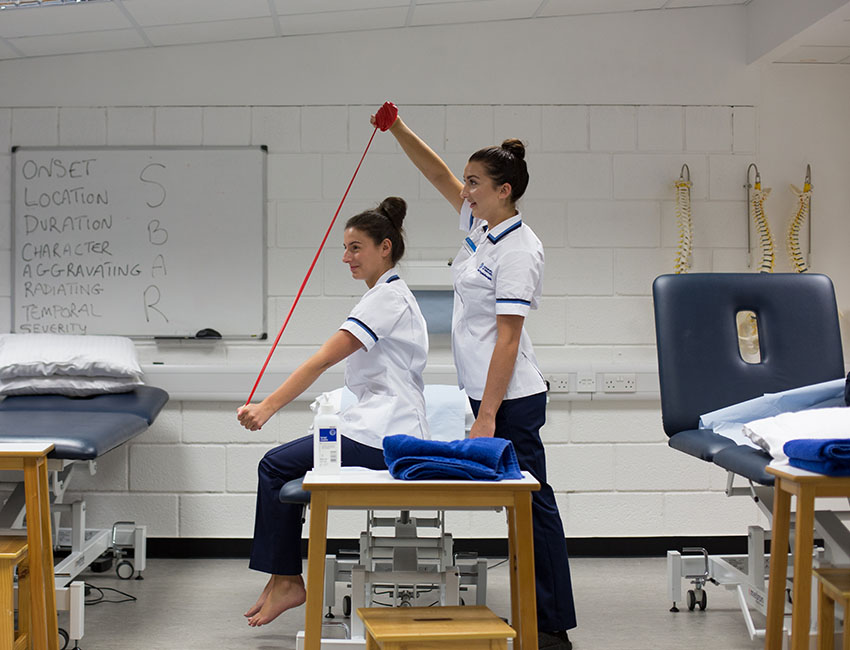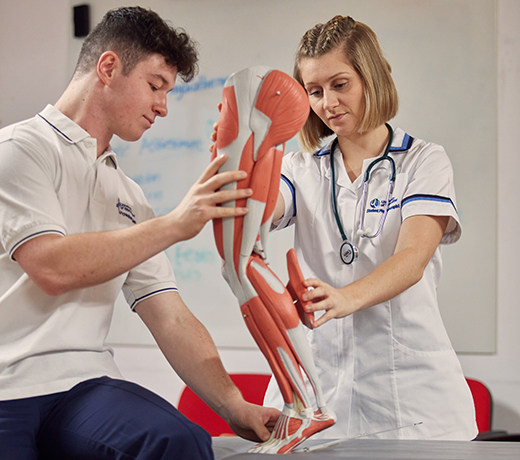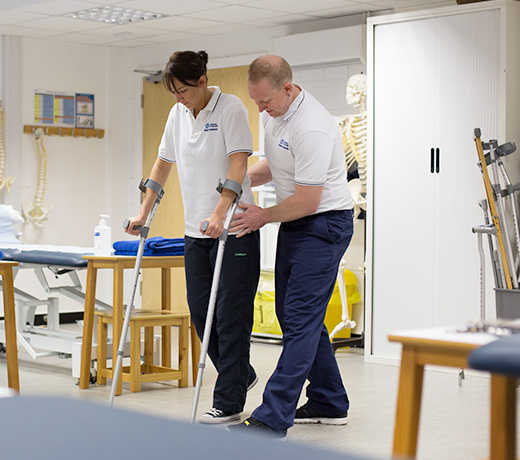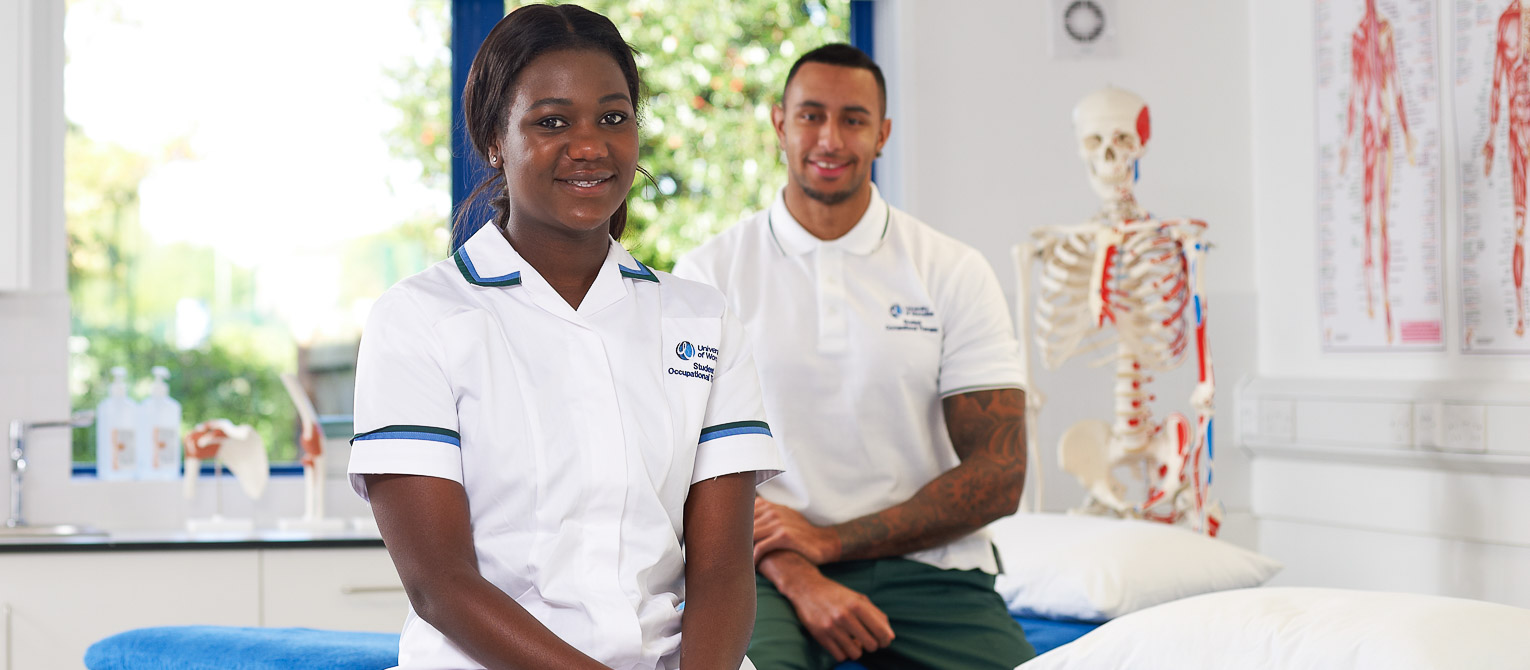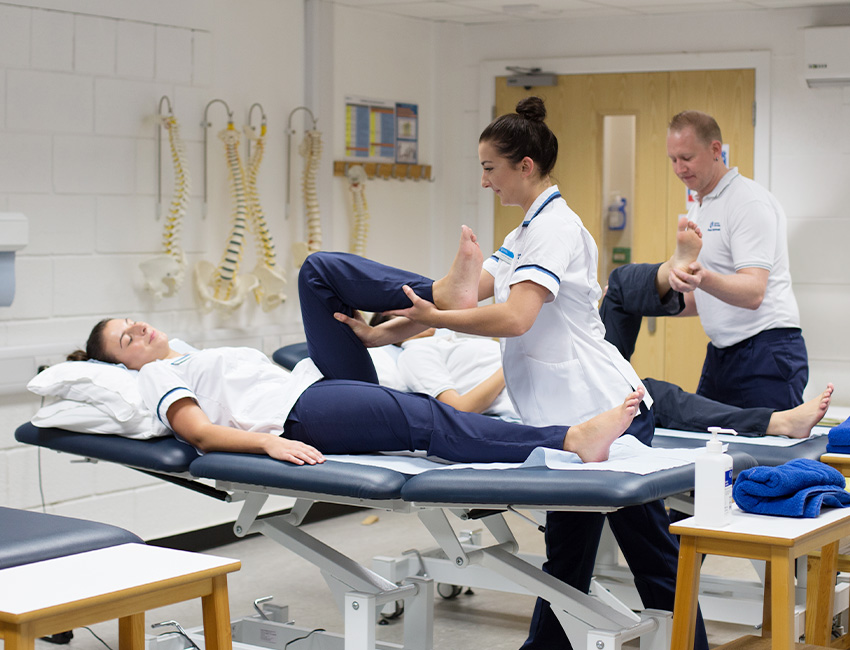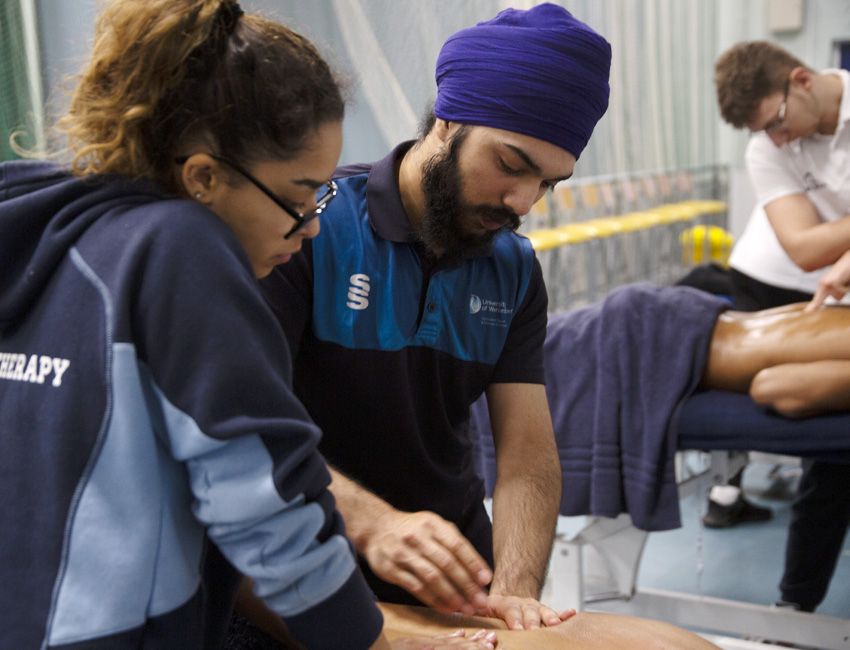You’ll need to apply for this course through your employer, with their support. Individuals cannot apply directly to the University.
This means that when you graduate, you can apply for registration to practice as a Chartered Physiotherapist.
Overview
After building a strong foundation of anatomical knowledge, you will learn how to diagnose and rehabilitate across a range of conditions, as well as how to prevent illness and disease. You will gain substantial practical experience in our purpose-built simulation laboratories and a range of real-life clinical environments, such as hospitals.
Our team of experienced physiotherapists will supervise you as you complete 1,000 hours of placement in different clinical, health, and social care settings. This gives you familiarity with the profession, patients, and various conditions.
You’ll study alongside students from our Medicine, Nursing, Social Work, and Occupational Therapy courses, providing opportunities to learn from each other and preparing you to work seamlessly in a ‘one workforce’ team in the NHS.
The Physiotherapy Degree Apprenticeship is delivered alongside an employing partner organisation allowing you to immediately embed your learning into practice in the workplace. This route to a professional qualification responds to contemporary workforce challenges in health and social care, as well as working to widen participation. The apprenticeship is suitable for those in an existing role, for example, physiotherapy assistant or a massage therapist, as well as those that are new to this sector.
How apprentices study
Teaching and learning on an apprenticeship will be a collaborative process between you, your employer and the university. This will include attending university for tutorials, work-based learning, when required to complete the apprenticeship an alternative placement and mentoring by a qualified/experienced colleague.
In a typical week apprentices have around 6 - 9 contact hours of university teaching across 3 semesters. However, the precise contact hours will depend on the year of study and the module you are studying. An example of teaching contact time will be structured around:
- 3 hours of interactive workshops/skills simulations or student seminars either face to face or online
- 3 hours of (large group) lectures either face to face or online
- 3 hours of asynchronous online teaching and learning
Apprenticeship students will have the opportunity to study alongside other students completing a BA (Hons) or BSc (Hons) Degrees.
As an apprentice, you’ll spend part of your working time developing the knowledge, skills and behaviours needed for your qualification. This is known as ‘off-the-job’ learning, and your employer will support you to complete it. You and your employer will agree how this learning is structured to best support your development and progress.
Course content
We regularly review our courses to reflect the latest research and developments in the subject area, as well as feedback from students, employers and the wider sector. As a result, modules may change to ensure the course remains current and relevant.
Careers
Most graduate apprentices are offered roles within their work place as registered physiotherapists.
You will become a scientifically oriented clinician with transferable intellectual and practical skills. You’ll also develop the advanced problem-solving and leadership skills required to succeed in the dynamic healthcare environment.
Physiotherapists are in demand across the UK and abroad, which creates many exciting job opportunities.
You could:
- become a senior physiotherapist or service manager in the NHS in a hospital, care home, GP practice, or other setting
- specialise in a specific area, like sports physiotherapy, stroke care, or working with children
- work for a professional sports club
- become self-employed and set up your own practice
- move into research or training
Course highlights
Teaching and assessment
The University places emphasis on enabling students to develop the independent learning capabilities that will equip you for lifelong learning and future employment, as well as academic achievement. A mixture of independent study, teaching and academic support through the personal academic tutoring system enables you to reflect on progress and build up a profile of skills, achievements and experiences that will enable you to flourish and be successful.
Teaching and assessment contents
You are taught through a combination of interactive workshops, lectures, seminars and group activities. Interactive workshops take a variety of formats and are intended to enable the application of learning through discussion and small group activities. Seminars enable the discussion and development of understanding of topics covered in lectures and group activities are focused on developing physiotherapy specific skills.
Apprentices will have opportunity to engage in inter-professional learning through the course along with health and social care professionals within the school of Allied Health and Community.
There will be opportunities to engage with IMPACT, the university organisation of service users and their families/carers to support teaching and assessments.
Learning is supported by a range of excellent learning facilities including the Library Services at The Hive, virtual learning environments and extensive electronic learning resources.
Regular meetings will be scheduled between the apprentice, the university and then employer to monitor and support learning and development with goal setting.
Placements in a setting different to their employed role will be embedded into course. This will enable apprentices to apply their knowledge, skills and behaviours in a variety of setting within the pillars of physiotherapy professional practice.
Entry requirements
We accept a range of qualifications, including Access to HE Diplomas. We also take into account any work or life experiences you have, alongside any qualifications you hold.
You’ll need to apply for this course through your employer, with their support. Individuals cannot apply directly to the University.
Any questions?
If you have any questions about entry requirements, please call our Admissions Office on 01905 855111 or email admissions@worc.ac.uk.
Fees
Fees contents
Fees for this apprenticeship will be paid by the employer, through Department for Education (DfE) apprenticeship funding.
How to apply
How to apply contents
All applications are through your employer, and you must have the support of your employer to complete the Level 6 Physiotherapy Apprenticeship.
Please discuss the possibility of completing the apprenticeship with your line manager and/or HR department. Your employer can then contact the University to discuss applying to the programme.
Individuals cannot apply directly to the University.
Contact
If you have any questions, please get in touch. We're here to help you every step of the way.

Apprenticeships team
apprenticeships@worc.ac.ukMore to explore
Open Days
Visiting us is the best way to get a feel for student life at the University of Worcester.

The City of Worcester
Worcester is a welcoming university city with great transport links and plenty of student parking.

Accommodation
Benefit from our accommodation guarantee. We have rooms on campus to suit every budget including en-suite options.

